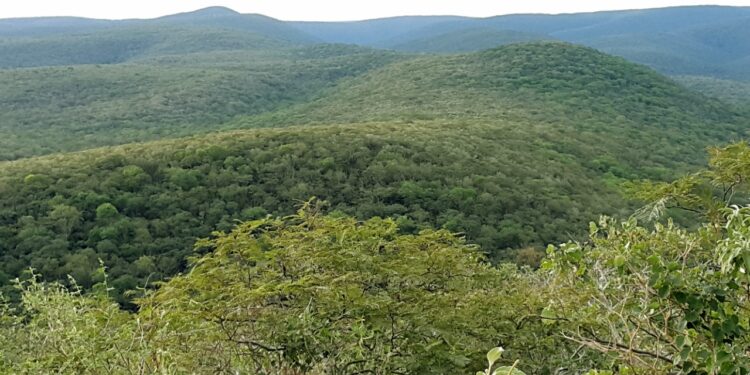AsunciĂłn, Agencia IP.- During an interview on the program Tribuna on Paraguay TV, VĂctor Vera, coordinator of the international platform Tropical Forest Alliance (TFA) in Paraguay, shared his insights on the challenges and opportunities that the country faces in terms of sustainability and responsible development.
TFA is a global initiative that promotes collective action to reduce deforestation and encourage sustainable agricultural and livestock practices. During the interview, Vera discussed how the country can move toward a more balanced model combining productivity and environmental conservation.
TFA: A collective approach to sustainability
The Tropical Forest Alliance (TFA) is an international network launched at the World Economic Forum. Its mission is to foster dialogue between key sectors, such as governments, businesses, and civil society, to promote economic development that does not destroy ecosystems.
As Vera explained, TFA does not function as an executor of projects but rather as a platform for dialogue and collective action. «We are not an institution that promotes projects, but institutions that promote conversation, dialogue, and the joint search for solutions. We know we will never fully agree, but we aim to reach the maximum possible consensus to move towards sustainability,» Vera stated.
«The heat peaks in the summer are quite significant. People and vulnerable communities suffer; trucks deliver water monthly, and production also suffers.»
Regarding its involvement in Paraguay, TFA has been working in the Chaco and other critical regions of Latin America, such as the Amazon and the Brazilian Cerrado. «We are in those places where human action is necessary to foster forest conservation and generate sustainable development,» Vera said.
The challenge of sustainability in production
Vera acknowledged that transitioning to more sustainable agricultural and livestock practices faces various challenges, especially in an economy that has historically depended on expanding farming frontiers.
«We are institutions that promote conversation, dialogue, and the joint search for solutions.»
However, he emphasized that soil must be seen not just as a means of production but as an ecological system that, if degraded, will negatively affect both productivity and the well-being of future generations. «In local conditions, we must favor our productive system. We must treat our soil more as an ecosystem and not just as a productive substrate,» Vera explained.
The importance of Chaco in global conservation
One of the most critical areas for conservation in Paraguay is the Chaco. This ecosystem harbors rich biodiversity but is threatened by the expansion of the agricultural and livestock frontiers. In this regard, Vera mentioned that Chaco is one of the regions most affected by climate change, with extreme temperatures and phenomena such as soil salinization threatening its ability to remain productive in the future.
«The heat peaks in the summer are quite significant. People and vulnerable communities suffer; trucks deliver water monthly, and production also suffers. Livestock is stopping eating and seeking shade because it’s extremely hot. In addition to favoring the soil, water, and biodiversity, we need to find ways to plant more trees. These systems are called silvopastoral so that production is not affected by these heat peaks we are experiencing,» he added.
 Victor Roberti Vera Monge, Paraguayan Tropical Forest Alliance Coordinator.
Victor Roberti Vera Monge, Paraguayan Tropical Forest Alliance Coordinator.
Successful cases of integration between production and conservation
Despite the challenges, Vera also pointed out that there are successful examples in Latin America that could serve as models for Paraguay. In Colombia, for instance, the law prohibits the conversion of forests into agricultural land. In Brazil, the PSI (Produce, Conserve, Integrate) program is being implemented, which promotes sustainable livestock farming and the integration of indigenous communities into land management. This program seeks to generate economic and ecological benefits for producers by promoting practices respecting environmental limits. Vera indicated that the Brazilian case is particularly relevant for Paraguay.
As Paraguay seeks to position itself as a regional leader in sustainability, the key will be to build strategic alliances between the government, businesses, indigenous communities, and private producers. With a collaborative approach and appropriate public policies, Paraguay has the opportunity to protect its invaluable biodiversity while fostering sustainable economic growth.
Source link : http://www.bing.com/news/apiclick.aspx?ref=FexRss&aid=&tid=6751c393785346a686f0c58f3c6b8792&url=https%3A%2F%2Fwww.ip.gov.py%2Fip%2F2024%2F11%2F29%2Fchallenges-and-opportunities-for-sustainability-in-paraguay-a-vision-from-the-tropical-forest-alliance%2F&c=16451871126964832395&mkt=en-us
Author :
Publish date : 2024-11-29 00:07:00
Copyright for syndicated content belongs to the linked Source.










